Educating People with Diabetes about Self-Management in Community in India
VerifiedAdded on 2023/04/08
|16
|2974
|71
AI Summary
This research proposal focuses on educating people with diabetes about self-management in the community in India. It discusses the importance of self-care, the benefits of education, challenges in providing education, and the impacts of lack of knowledge on people's health. The research aims to improve the quality of life for individuals with diabetes and raise awareness among healthcare workers.
Contribute Materials
Your contribution can guide someone’s learning journey. Share your
documents today.
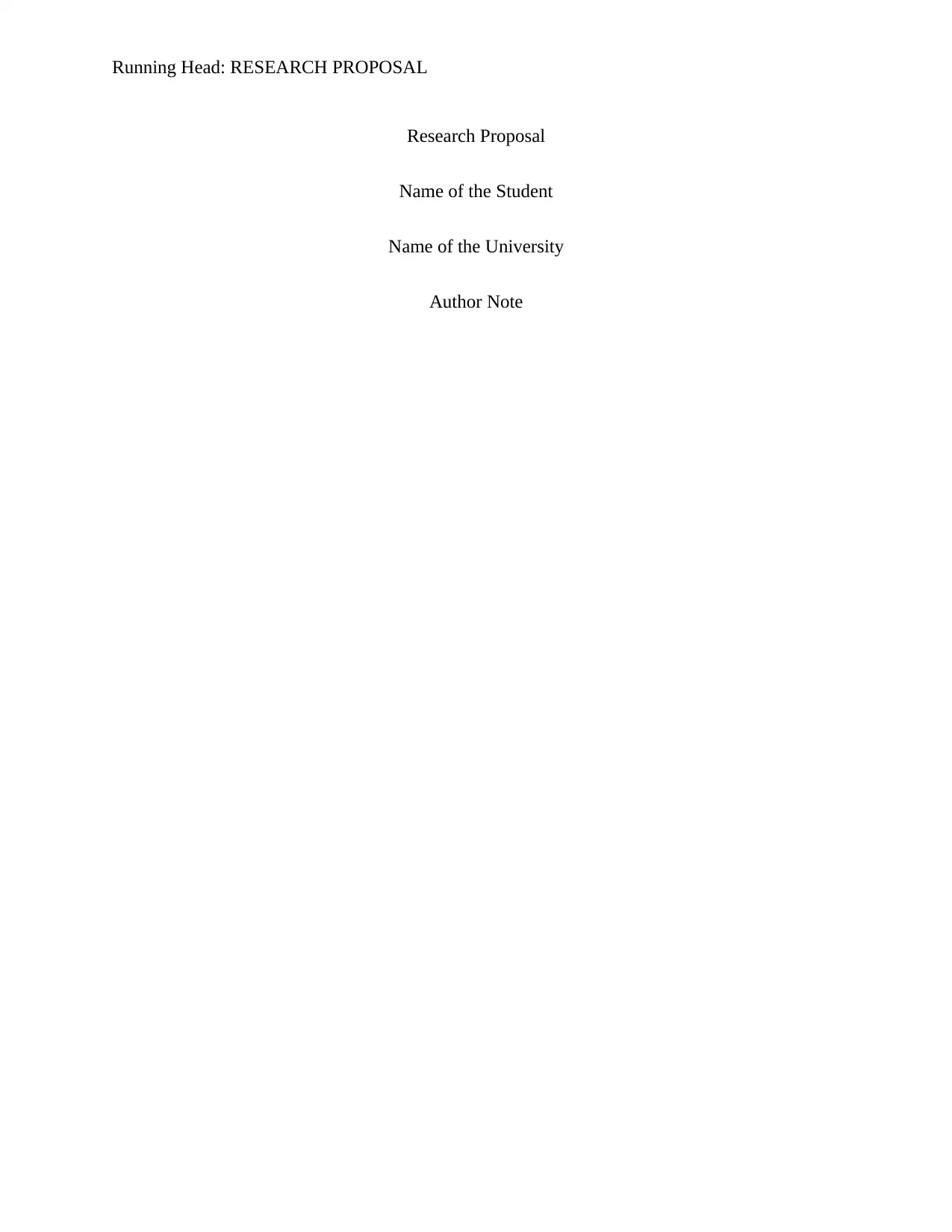
Running Head: RESEARCH PROPOSAL
Research Proposal
Name of the Student
Name of the University
Author Note
Research Proposal
Name of the Student
Name of the University
Author Note
Secure Best Marks with AI Grader
Need help grading? Try our AI Grader for instant feedback on your assignments.
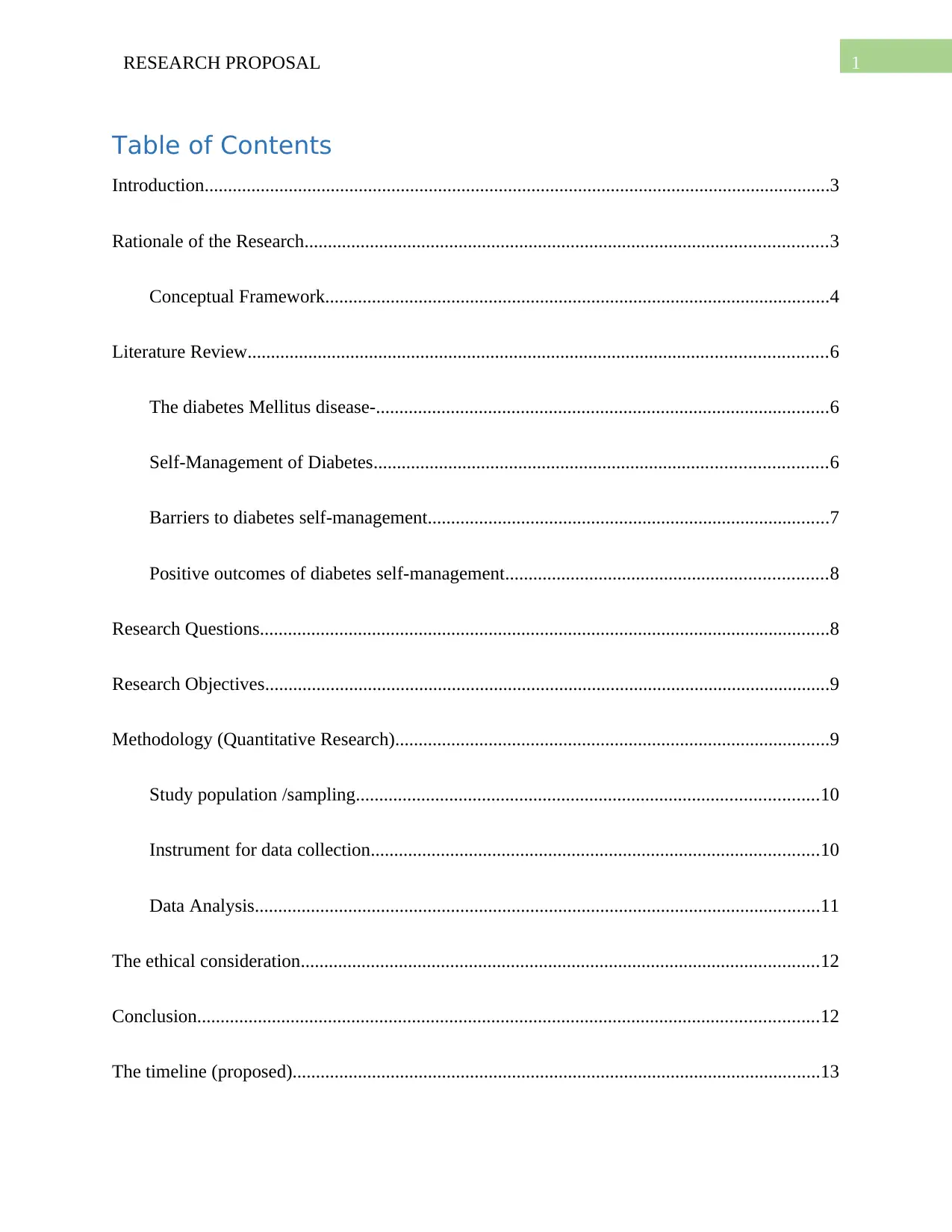
1RESEARCH PROPOSAL
Table of Contents
Introduction......................................................................................................................................3
Rationale of the Research................................................................................................................3
Conceptual Framework............................................................................................................4
Literature Review............................................................................................................................6
The diabetes Mellitus disease-.................................................................................................6
Self-Management of Diabetes.................................................................................................6
Barriers to diabetes self-management......................................................................................7
Positive outcomes of diabetes self-management.....................................................................8
Research Questions..........................................................................................................................8
Research Objectives.........................................................................................................................9
Methodology (Quantitative Research).............................................................................................9
Study population /sampling...................................................................................................10
Instrument for data collection................................................................................................10
Data Analysis.........................................................................................................................11
The ethical consideration...............................................................................................................12
Conclusion.....................................................................................................................................12
The timeline (proposed).................................................................................................................13
Table of Contents
Introduction......................................................................................................................................3
Rationale of the Research................................................................................................................3
Conceptual Framework............................................................................................................4
Literature Review............................................................................................................................6
The diabetes Mellitus disease-.................................................................................................6
Self-Management of Diabetes.................................................................................................6
Barriers to diabetes self-management......................................................................................7
Positive outcomes of diabetes self-management.....................................................................8
Research Questions..........................................................................................................................8
Research Objectives.........................................................................................................................9
Methodology (Quantitative Research).............................................................................................9
Study population /sampling...................................................................................................10
Instrument for data collection................................................................................................10
Data Analysis.........................................................................................................................11
The ethical consideration...............................................................................................................12
Conclusion.....................................................................................................................................12
The timeline (proposed).................................................................................................................13
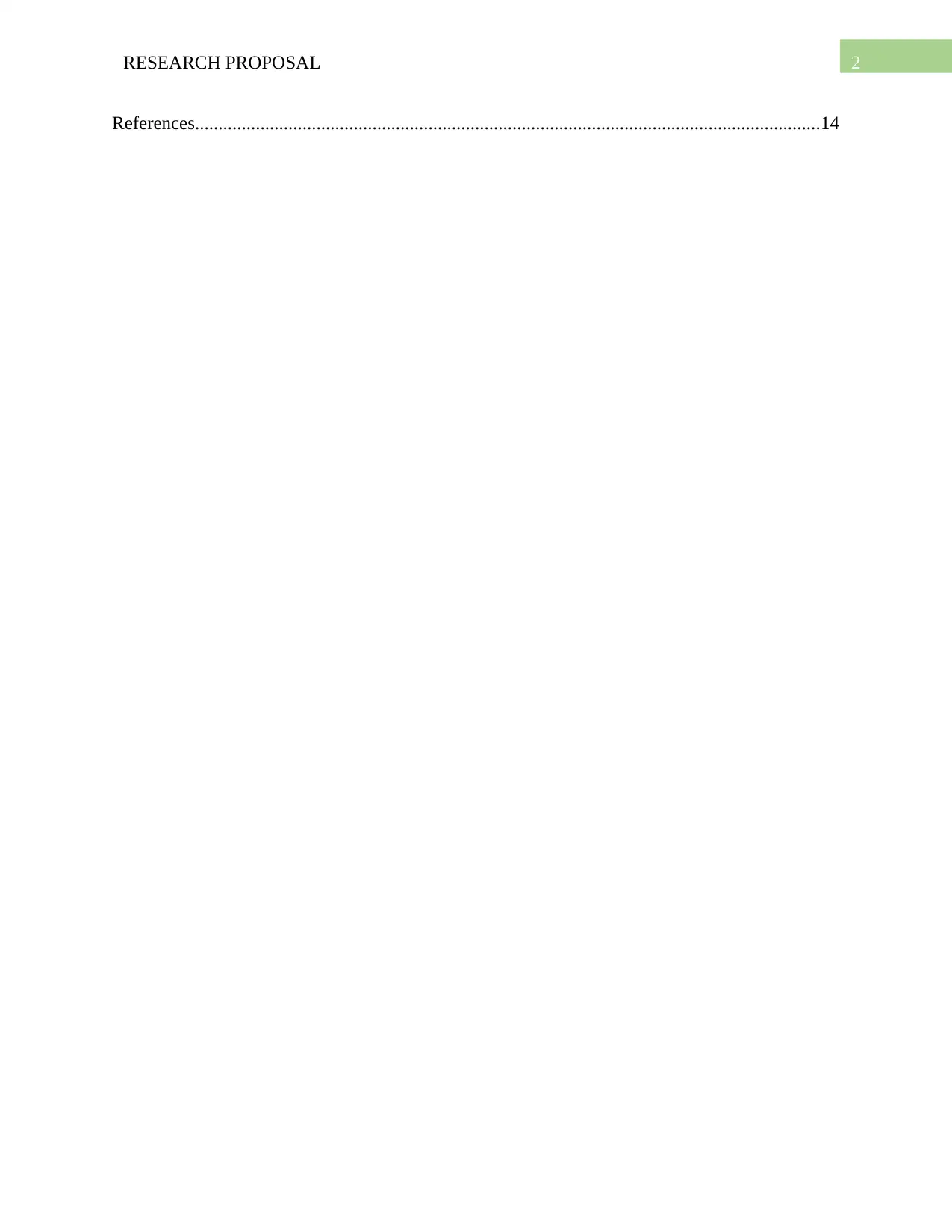
2RESEARCH PROPOSAL
References......................................................................................................................................14
References......................................................................................................................................14
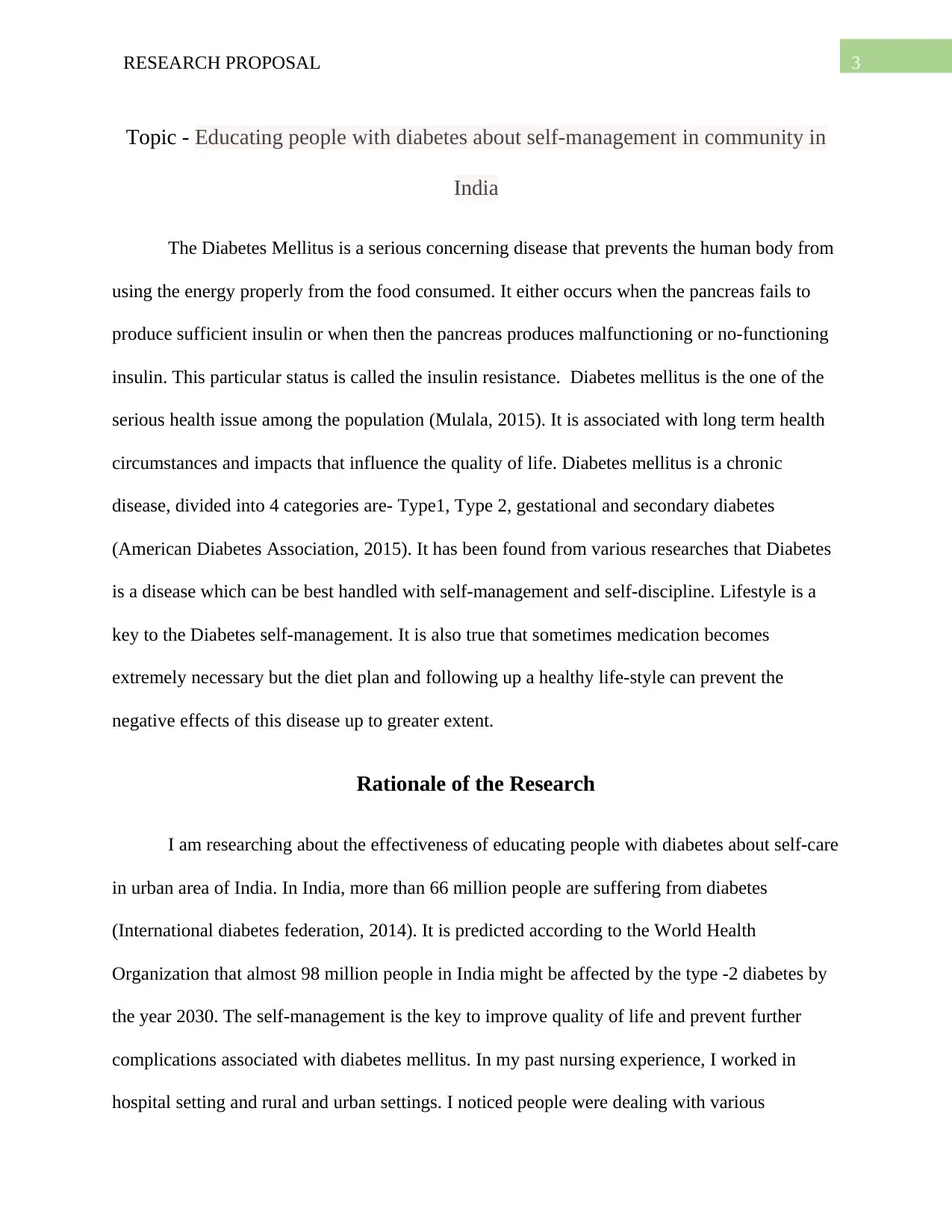
3RESEARCH PROPOSAL
Topic - Educating people with diabetes about self-management in community in
India
The Diabetes Mellitus is a serious concerning disease that prevents the human body from
using the energy properly from the food consumed. It either occurs when the pancreas fails to
produce sufficient insulin or when then the pancreas produces malfunctioning or no-functioning
insulin. This particular status is called the insulin resistance. Diabetes mellitus is the one of the
serious health issue among the population (Mulala, 2015). It is associated with long term health
circumstances and impacts that influence the quality of life. Diabetes mellitus is a chronic
disease, divided into 4 categories are- Type1, Type 2, gestational and secondary diabetes
(American Diabetes Association, 2015). It has been found from various researches that Diabetes
is a disease which can be best handled with self-management and self-discipline. Lifestyle is a
key to the Diabetes self-management. It is also true that sometimes medication becomes
extremely necessary but the diet plan and following up a healthy life-style can prevent the
negative effects of this disease up to greater extent.
Rationale of the Research
I am researching about the effectiveness of educating people with diabetes about self-care
in urban area of India. In India, more than 66 million people are suffering from diabetes
(International diabetes federation, 2014). It is predicted according to the World Health
Organization that almost 98 million people in India might be affected by the type -2 diabetes by
the year 2030. The self-management is the key to improve quality of life and prevent further
complications associated with diabetes mellitus. In my past nursing experience, I worked in
hospital setting and rural and urban settings. I noticed people were dealing with various
Topic - Educating people with diabetes about self-management in community in
India
The Diabetes Mellitus is a serious concerning disease that prevents the human body from
using the energy properly from the food consumed. It either occurs when the pancreas fails to
produce sufficient insulin or when then the pancreas produces malfunctioning or no-functioning
insulin. This particular status is called the insulin resistance. Diabetes mellitus is the one of the
serious health issue among the population (Mulala, 2015). It is associated with long term health
circumstances and impacts that influence the quality of life. Diabetes mellitus is a chronic
disease, divided into 4 categories are- Type1, Type 2, gestational and secondary diabetes
(American Diabetes Association, 2015). It has been found from various researches that Diabetes
is a disease which can be best handled with self-management and self-discipline. Lifestyle is a
key to the Diabetes self-management. It is also true that sometimes medication becomes
extremely necessary but the diet plan and following up a healthy life-style can prevent the
negative effects of this disease up to greater extent.
Rationale of the Research
I am researching about the effectiveness of educating people with diabetes about self-care
in urban area of India. In India, more than 66 million people are suffering from diabetes
(International diabetes federation, 2014). It is predicted according to the World Health
Organization that almost 98 million people in India might be affected by the type -2 diabetes by
the year 2030. The self-management is the key to improve quality of life and prevent further
complications associated with diabetes mellitus. In my past nursing experience, I worked in
hospital setting and rural and urban settings. I noticed people were dealing with various
Secure Best Marks with AI Grader
Need help grading? Try our AI Grader for instant feedback on your assignments.
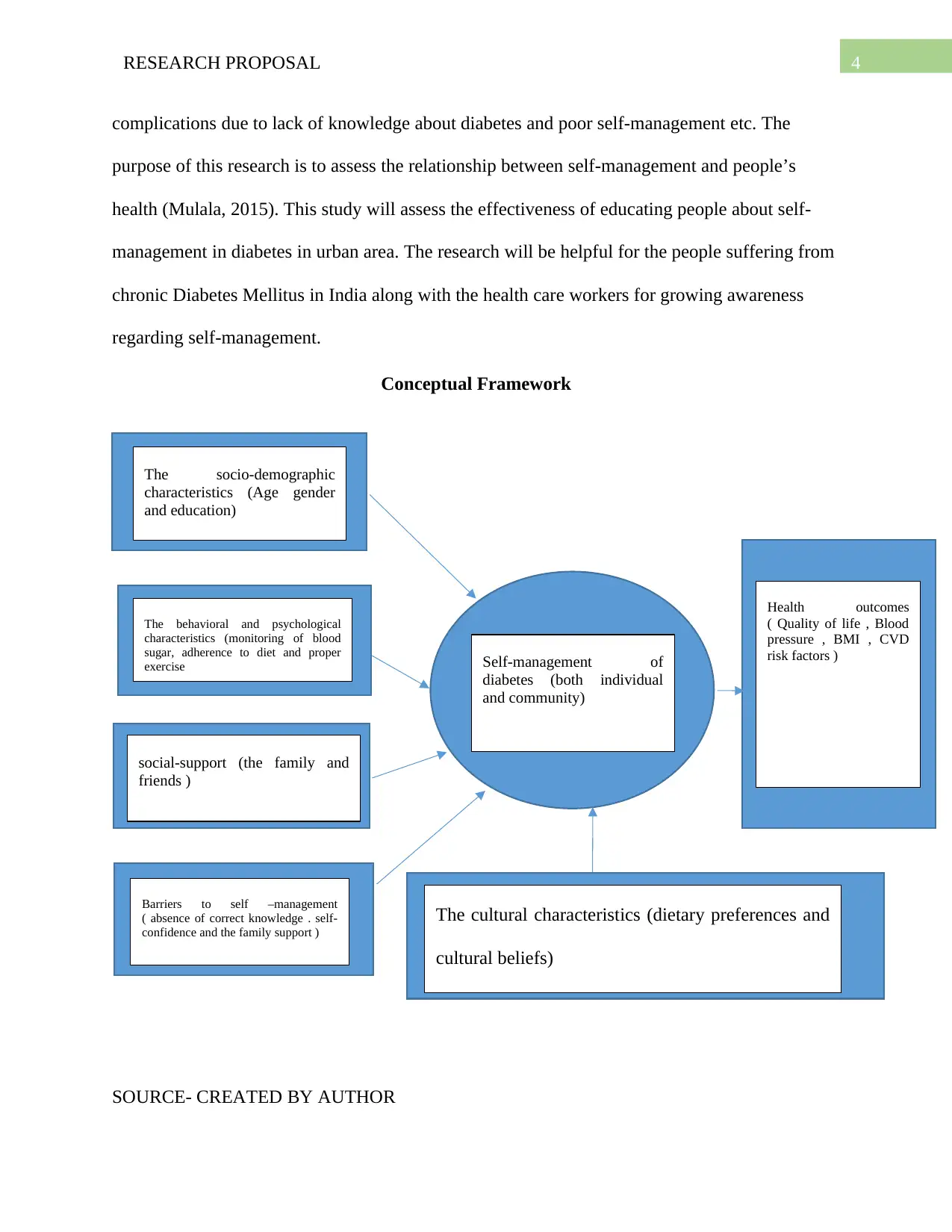
4RESEARCH PROPOSAL
complications due to lack of knowledge about diabetes and poor self-management etc. The
purpose of this research is to assess the relationship between self-management and people’s
health (Mulala, 2015). This study will assess the effectiveness of educating people about self-
management in diabetes in urban area. The research will be helpful for the people suffering from
chronic Diabetes Mellitus in India along with the health care workers for growing awareness
regarding self-management.
Conceptual Framework
SOURCE- CREATED BY AUTHOR
Self-management of
diabetes (both individual
and community)
The socio-demographic
characteristics (Age gender
and education)
The behavioral and psychological
characteristics (monitoring of blood
sugar, adherence to diet and proper
exercise
social-support (the family and
friends )
Barriers to self –management
( absence of correct knowledge . self-
confidence and the family support )
The cultural characteristics (dietary preferences and
cultural beliefs)
Health outcomes
( Quality of life , Blood
pressure , BMI , CVD
risk factors )
complications due to lack of knowledge about diabetes and poor self-management etc. The
purpose of this research is to assess the relationship between self-management and people’s
health (Mulala, 2015). This study will assess the effectiveness of educating people about self-
management in diabetes in urban area. The research will be helpful for the people suffering from
chronic Diabetes Mellitus in India along with the health care workers for growing awareness
regarding self-management.
Conceptual Framework
SOURCE- CREATED BY AUTHOR
Self-management of
diabetes (both individual
and community)
The socio-demographic
characteristics (Age gender
and education)
The behavioral and psychological
characteristics (monitoring of blood
sugar, adherence to diet and proper
exercise
social-support (the family and
friends )
Barriers to self –management
( absence of correct knowledge . self-
confidence and the family support )
The cultural characteristics (dietary preferences and
cultural beliefs)
Health outcomes
( Quality of life , Blood
pressure , BMI , CVD
risk factors )
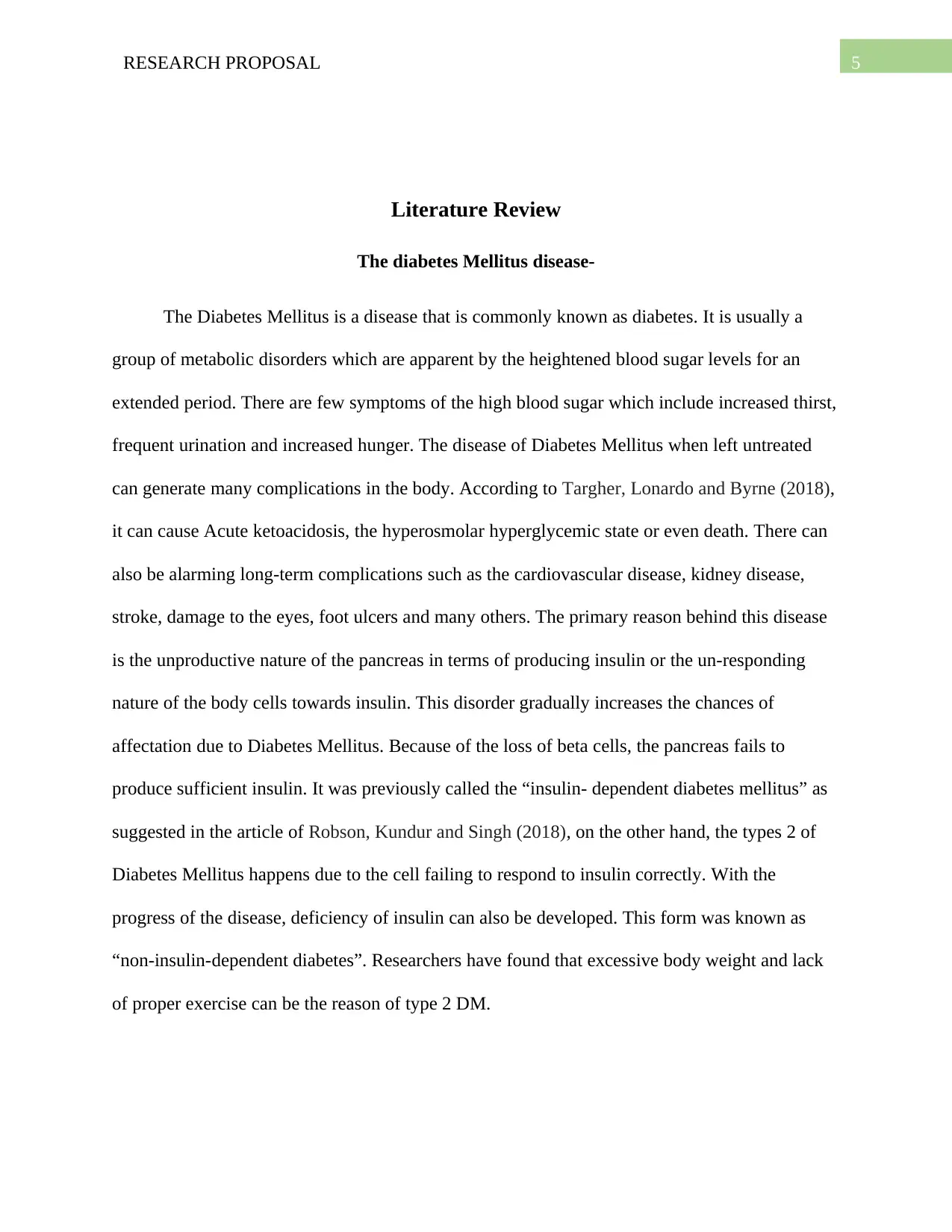
5RESEARCH PROPOSAL
Literature Review
The diabetes Mellitus disease-
The Diabetes Mellitus is a disease that is commonly known as diabetes. It is usually a
group of metabolic disorders which are apparent by the heightened blood sugar levels for an
extended period. There are few symptoms of the high blood sugar which include increased thirst,
frequent urination and increased hunger. The disease of Diabetes Mellitus when left untreated
can generate many complications in the body. According to Targher, Lonardo and Byrne (2018),
it can cause Acute ketoacidosis, the hyperosmolar hyperglycemic state or even death. There can
also be alarming long-term complications such as the cardiovascular disease, kidney disease,
stroke, damage to the eyes, foot ulcers and many others. The primary reason behind this disease
is the unproductive nature of the pancreas in terms of producing insulin or the un-responding
nature of the body cells towards insulin. This disorder gradually increases the chances of
affectation due to Diabetes Mellitus. Because of the loss of beta cells, the pancreas fails to
produce sufficient insulin. It was previously called the “insulin- dependent diabetes mellitus” as
suggested in the article of Robson, Kundur and Singh (2018), on the other hand, the types 2 of
Diabetes Mellitus happens due to the cell failing to respond to insulin correctly. With the
progress of the disease, deficiency of insulin can also be developed. This form was known as
“non-insulin-dependent diabetes”. Researchers have found that excessive body weight and lack
of proper exercise can be the reason of type 2 DM.
Literature Review
The diabetes Mellitus disease-
The Diabetes Mellitus is a disease that is commonly known as diabetes. It is usually a
group of metabolic disorders which are apparent by the heightened blood sugar levels for an
extended period. There are few symptoms of the high blood sugar which include increased thirst,
frequent urination and increased hunger. The disease of Diabetes Mellitus when left untreated
can generate many complications in the body. According to Targher, Lonardo and Byrne (2018),
it can cause Acute ketoacidosis, the hyperosmolar hyperglycemic state or even death. There can
also be alarming long-term complications such as the cardiovascular disease, kidney disease,
stroke, damage to the eyes, foot ulcers and many others. The primary reason behind this disease
is the unproductive nature of the pancreas in terms of producing insulin or the un-responding
nature of the body cells towards insulin. This disorder gradually increases the chances of
affectation due to Diabetes Mellitus. Because of the loss of beta cells, the pancreas fails to
produce sufficient insulin. It was previously called the “insulin- dependent diabetes mellitus” as
suggested in the article of Robson, Kundur and Singh (2018), on the other hand, the types 2 of
Diabetes Mellitus happens due to the cell failing to respond to insulin correctly. With the
progress of the disease, deficiency of insulin can also be developed. This form was known as
“non-insulin-dependent diabetes”. Researchers have found that excessive body weight and lack
of proper exercise can be the reason of type 2 DM.
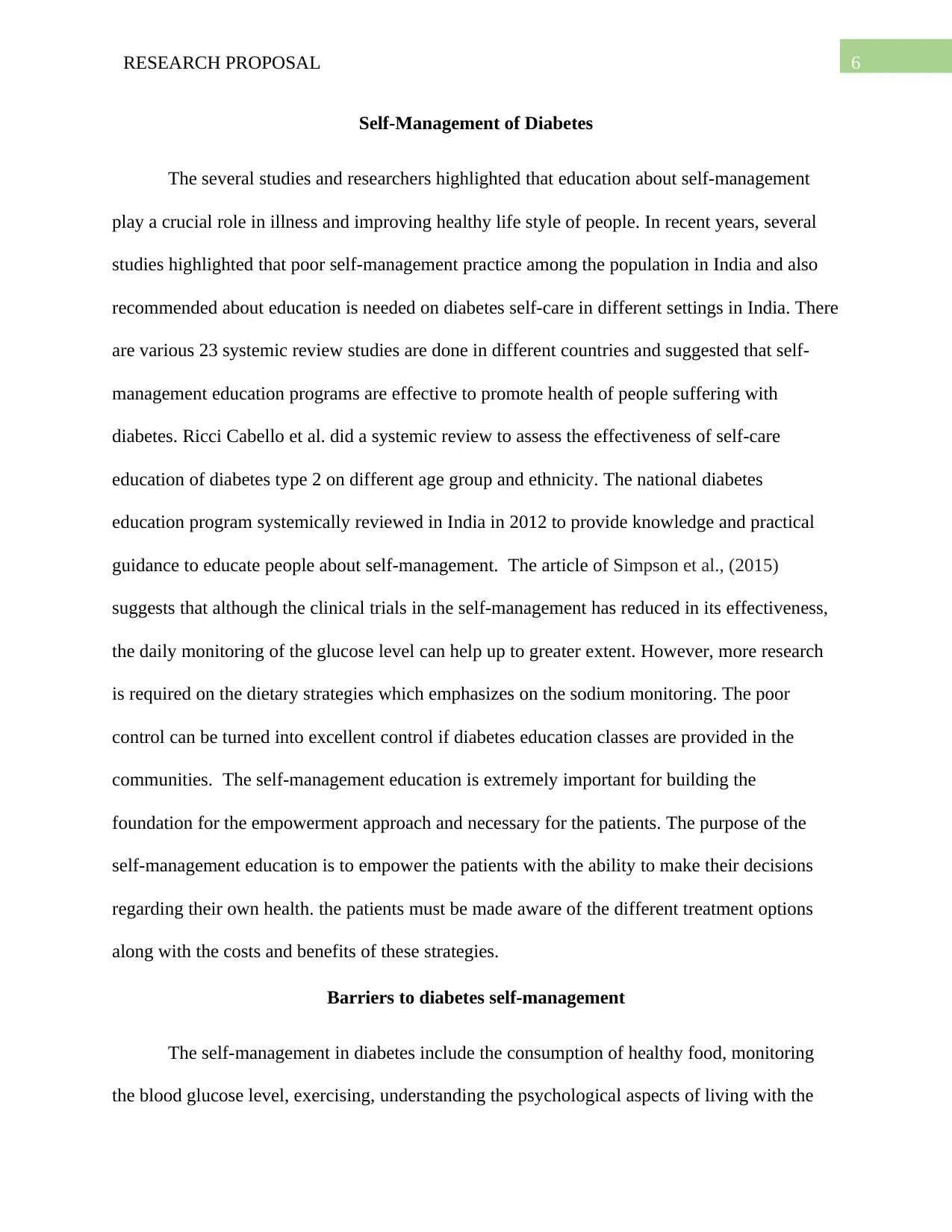
6RESEARCH PROPOSAL
Self-Management of Diabetes
The several studies and researchers highlighted that education about self-management
play a crucial role in illness and improving healthy life style of people. In recent years, several
studies highlighted that poor self-management practice among the population in India and also
recommended about education is needed on diabetes self-care in different settings in India. There
are various 23 systemic review studies are done in different countries and suggested that self-
management education programs are effective to promote health of people suffering with
diabetes. Ricci Cabello et al. did a systemic review to assess the effectiveness of self-care
education of diabetes type 2 on different age group and ethnicity. The national diabetes
education program systemically reviewed in India in 2012 to provide knowledge and practical
guidance to educate people about self-management. The article of Simpson et al., (2015)
suggests that although the clinical trials in the self-management has reduced in its effectiveness,
the daily monitoring of the glucose level can help up to greater extent. However, more research
is required on the dietary strategies which emphasizes on the sodium monitoring. The poor
control can be turned into excellent control if diabetes education classes are provided in the
communities. The self-management education is extremely important for building the
foundation for the empowerment approach and necessary for the patients. The purpose of the
self-management education is to empower the patients with the ability to make their decisions
regarding their own health. the patients must be made aware of the different treatment options
along with the costs and benefits of these strategies.
Barriers to diabetes self-management
The self-management in diabetes include the consumption of healthy food, monitoring
the blood glucose level, exercising, understanding the psychological aspects of living with the
Self-Management of Diabetes
The several studies and researchers highlighted that education about self-management
play a crucial role in illness and improving healthy life style of people. In recent years, several
studies highlighted that poor self-management practice among the population in India and also
recommended about education is needed on diabetes self-care in different settings in India. There
are various 23 systemic review studies are done in different countries and suggested that self-
management education programs are effective to promote health of people suffering with
diabetes. Ricci Cabello et al. did a systemic review to assess the effectiveness of self-care
education of diabetes type 2 on different age group and ethnicity. The national diabetes
education program systemically reviewed in India in 2012 to provide knowledge and practical
guidance to educate people about self-management. The article of Simpson et al., (2015)
suggests that although the clinical trials in the self-management has reduced in its effectiveness,
the daily monitoring of the glucose level can help up to greater extent. However, more research
is required on the dietary strategies which emphasizes on the sodium monitoring. The poor
control can be turned into excellent control if diabetes education classes are provided in the
communities. The self-management education is extremely important for building the
foundation for the empowerment approach and necessary for the patients. The purpose of the
self-management education is to empower the patients with the ability to make their decisions
regarding their own health. the patients must be made aware of the different treatment options
along with the costs and benefits of these strategies.
Barriers to diabetes self-management
The self-management in diabetes include the consumption of healthy food, monitoring
the blood glucose level, exercising, understanding the psychological aspects of living with the
Paraphrase This Document
Need a fresh take? Get an instant paraphrase of this document with our AI Paraphraser
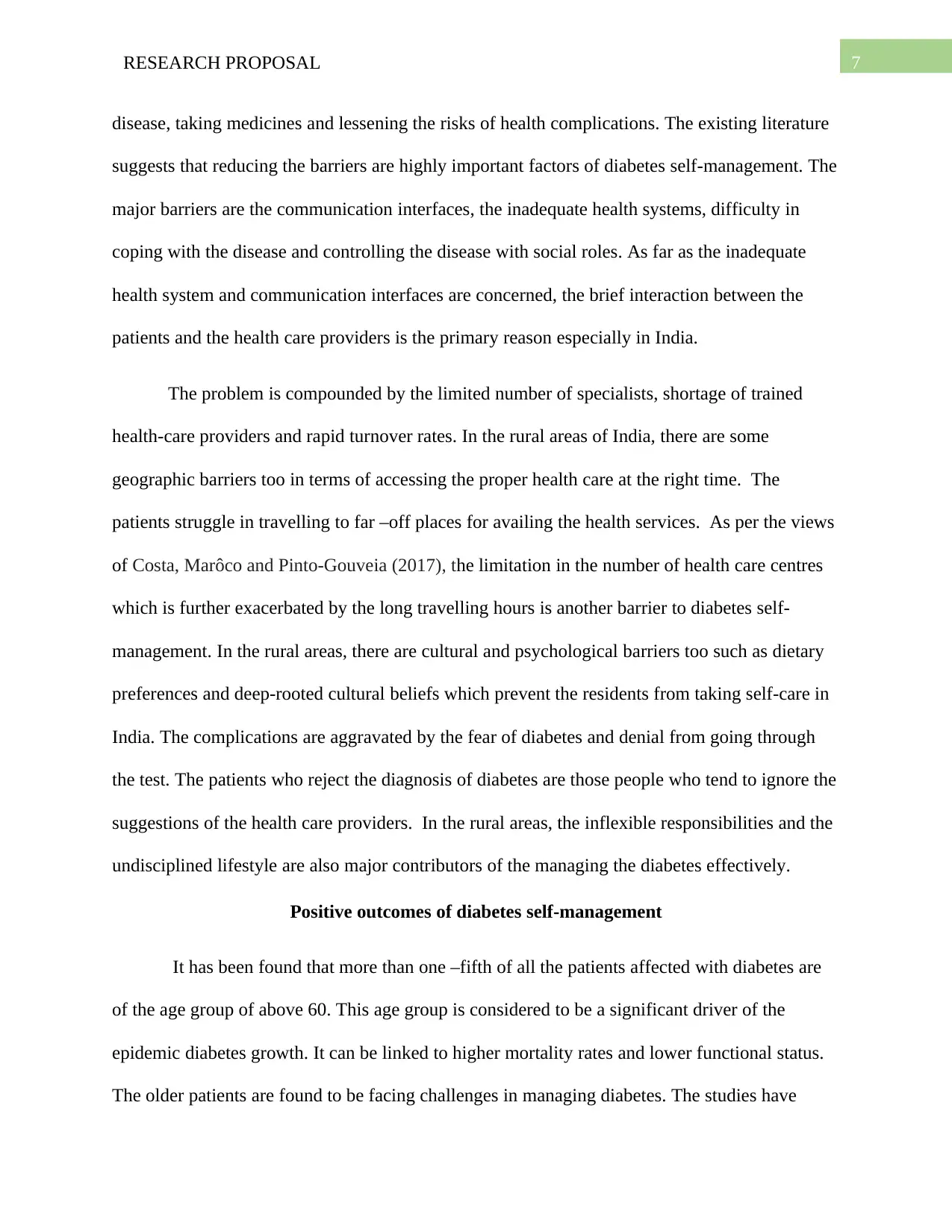
7RESEARCH PROPOSAL
disease, taking medicines and lessening the risks of health complications. The existing literature
suggests that reducing the barriers are highly important factors of diabetes self-management. The
major barriers are the communication interfaces, the inadequate health systems, difficulty in
coping with the disease and controlling the disease with social roles. As far as the inadequate
health system and communication interfaces are concerned, the brief interaction between the
patients and the health care providers is the primary reason especially in India.
The problem is compounded by the limited number of specialists, shortage of trained
health-care providers and rapid turnover rates. In the rural areas of India, there are some
geographic barriers too in terms of accessing the proper health care at the right time. The
patients struggle in travelling to far –off places for availing the health services. As per the views
of Costa, Marôco and Pinto‐Gouveia (2017), the limitation in the number of health care centres
which is further exacerbated by the long travelling hours is another barrier to diabetes self-
management. In the rural areas, there are cultural and psychological barriers too such as dietary
preferences and deep-rooted cultural beliefs which prevent the residents from taking self-care in
India. The complications are aggravated by the fear of diabetes and denial from going through
the test. The patients who reject the diagnosis of diabetes are those people who tend to ignore the
suggestions of the health care providers. In the rural areas, the inflexible responsibilities and the
undisciplined lifestyle are also major contributors of the managing the diabetes effectively.
Positive outcomes of diabetes self-management
It has been found that more than one –fifth of all the patients affected with diabetes are
of the age group of above 60. This age group is considered to be a significant driver of the
epidemic diabetes growth. It can be linked to higher mortality rates and lower functional status.
The older patients are found to be facing challenges in managing diabetes. The studies have
disease, taking medicines and lessening the risks of health complications. The existing literature
suggests that reducing the barriers are highly important factors of diabetes self-management. The
major barriers are the communication interfaces, the inadequate health systems, difficulty in
coping with the disease and controlling the disease with social roles. As far as the inadequate
health system and communication interfaces are concerned, the brief interaction between the
patients and the health care providers is the primary reason especially in India.
The problem is compounded by the limited number of specialists, shortage of trained
health-care providers and rapid turnover rates. In the rural areas of India, there are some
geographic barriers too in terms of accessing the proper health care at the right time. The
patients struggle in travelling to far –off places for availing the health services. As per the views
of Costa, Marôco and Pinto‐Gouveia (2017), the limitation in the number of health care centres
which is further exacerbated by the long travelling hours is another barrier to diabetes self-
management. In the rural areas, there are cultural and psychological barriers too such as dietary
preferences and deep-rooted cultural beliefs which prevent the residents from taking self-care in
India. The complications are aggravated by the fear of diabetes and denial from going through
the test. The patients who reject the diagnosis of diabetes are those people who tend to ignore the
suggestions of the health care providers. In the rural areas, the inflexible responsibilities and the
undisciplined lifestyle are also major contributors of the managing the diabetes effectively.
Positive outcomes of diabetes self-management
It has been found that more than one –fifth of all the patients affected with diabetes are
of the age group of above 60. This age group is considered to be a significant driver of the
epidemic diabetes growth. It can be linked to higher mortality rates and lower functional status.
The older patients are found to be facing challenges in managing diabetes. The studies have
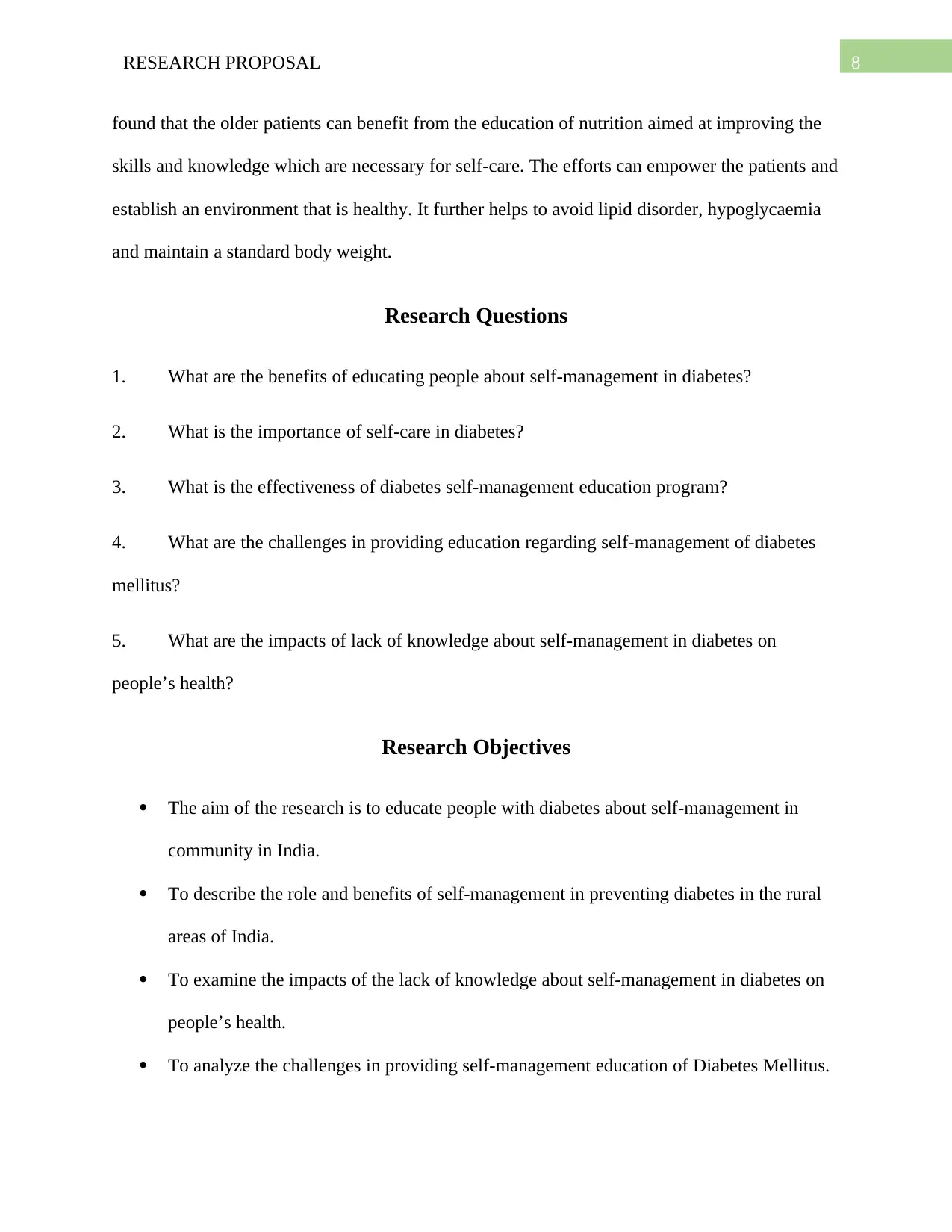
8RESEARCH PROPOSAL
found that the older patients can benefit from the education of nutrition aimed at improving the
skills and knowledge which are necessary for self-care. The efforts can empower the patients and
establish an environment that is healthy. It further helps to avoid lipid disorder, hypoglycaemia
and maintain a standard body weight.
Research Questions
1. What are the benefits of educating people about self-management in diabetes?
2. What is the importance of self-care in diabetes?
3. What is the effectiveness of diabetes self-management education program?
4. What are the challenges in providing education regarding self-management of diabetes
mellitus?
5. What are the impacts of lack of knowledge about self-management in diabetes on
people’s health?
Research Objectives
The aim of the research is to educate people with diabetes about self-management in
community in India.
To describe the role and benefits of self-management in preventing diabetes in the rural
areas of India.
To examine the impacts of the lack of knowledge about self-management in diabetes on
people’s health.
To analyze the challenges in providing self-management education of Diabetes Mellitus.
found that the older patients can benefit from the education of nutrition aimed at improving the
skills and knowledge which are necessary for self-care. The efforts can empower the patients and
establish an environment that is healthy. It further helps to avoid lipid disorder, hypoglycaemia
and maintain a standard body weight.
Research Questions
1. What are the benefits of educating people about self-management in diabetes?
2. What is the importance of self-care in diabetes?
3. What is the effectiveness of diabetes self-management education program?
4. What are the challenges in providing education regarding self-management of diabetes
mellitus?
5. What are the impacts of lack of knowledge about self-management in diabetes on
people’s health?
Research Objectives
The aim of the research is to educate people with diabetes about self-management in
community in India.
To describe the role and benefits of self-management in preventing diabetes in the rural
areas of India.
To examine the impacts of the lack of knowledge about self-management in diabetes on
people’s health.
To analyze the challenges in providing self-management education of Diabetes Mellitus.
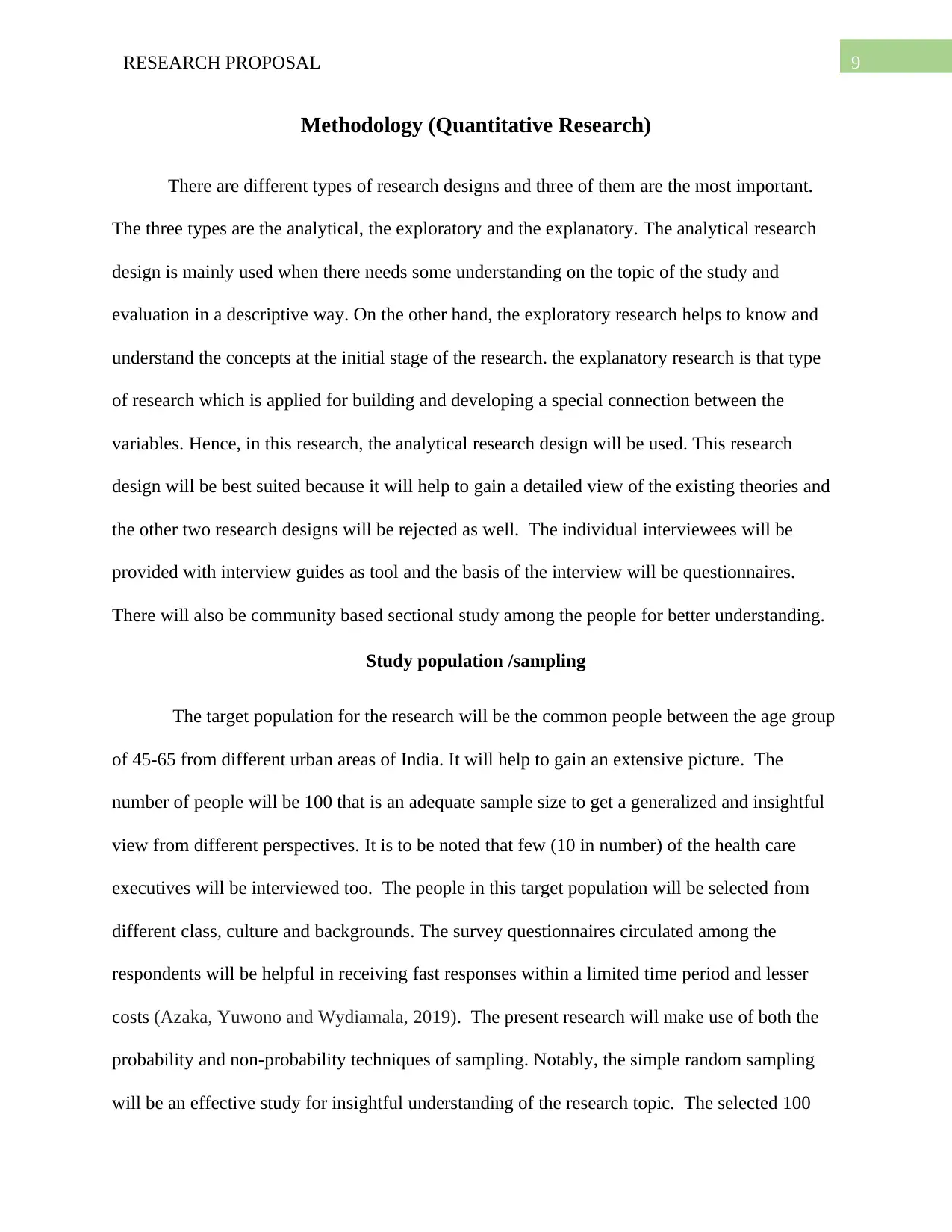
9RESEARCH PROPOSAL
Methodology (Quantitative Research)
There are different types of research designs and three of them are the most important.
The three types are the analytical, the exploratory and the explanatory. The analytical research
design is mainly used when there needs some understanding on the topic of the study and
evaluation in a descriptive way. On the other hand, the exploratory research helps to know and
understand the concepts at the initial stage of the research. the explanatory research is that type
of research which is applied for building and developing a special connection between the
variables. Hence, in this research, the analytical research design will be used. This research
design will be best suited because it will help to gain a detailed view of the existing theories and
the other two research designs will be rejected as well. The individual interviewees will be
provided with interview guides as tool and the basis of the interview will be questionnaires.
There will also be community based sectional study among the people for better understanding.
Study population /sampling
The target population for the research will be the common people between the age group
of 45-65 from different urban areas of India. It will help to gain an extensive picture. The
number of people will be 100 that is an adequate sample size to get a generalized and insightful
view from different perspectives. It is to be noted that few (10 in number) of the health care
executives will be interviewed too. The people in this target population will be selected from
different class, culture and backgrounds. The survey questionnaires circulated among the
respondents will be helpful in receiving fast responses within a limited time period and lesser
costs (Azaka, Yuwono and Wydiamala, 2019). The present research will make use of both the
probability and non-probability techniques of sampling. Notably, the simple random sampling
will be an effective study for insightful understanding of the research topic. The selected 100
Methodology (Quantitative Research)
There are different types of research designs and three of them are the most important.
The three types are the analytical, the exploratory and the explanatory. The analytical research
design is mainly used when there needs some understanding on the topic of the study and
evaluation in a descriptive way. On the other hand, the exploratory research helps to know and
understand the concepts at the initial stage of the research. the explanatory research is that type
of research which is applied for building and developing a special connection between the
variables. Hence, in this research, the analytical research design will be used. This research
design will be best suited because it will help to gain a detailed view of the existing theories and
the other two research designs will be rejected as well. The individual interviewees will be
provided with interview guides as tool and the basis of the interview will be questionnaires.
There will also be community based sectional study among the people for better understanding.
Study population /sampling
The target population for the research will be the common people between the age group
of 45-65 from different urban areas of India. It will help to gain an extensive picture. The
number of people will be 100 that is an adequate sample size to get a generalized and insightful
view from different perspectives. It is to be noted that few (10 in number) of the health care
executives will be interviewed too. The people in this target population will be selected from
different class, culture and backgrounds. The survey questionnaires circulated among the
respondents will be helpful in receiving fast responses within a limited time period and lesser
costs (Azaka, Yuwono and Wydiamala, 2019). The present research will make use of both the
probability and non-probability techniques of sampling. Notably, the simple random sampling
will be an effective study for insightful understanding of the research topic. The selected 100
Secure Best Marks with AI Grader
Need help grading? Try our AI Grader for instant feedback on your assignments.
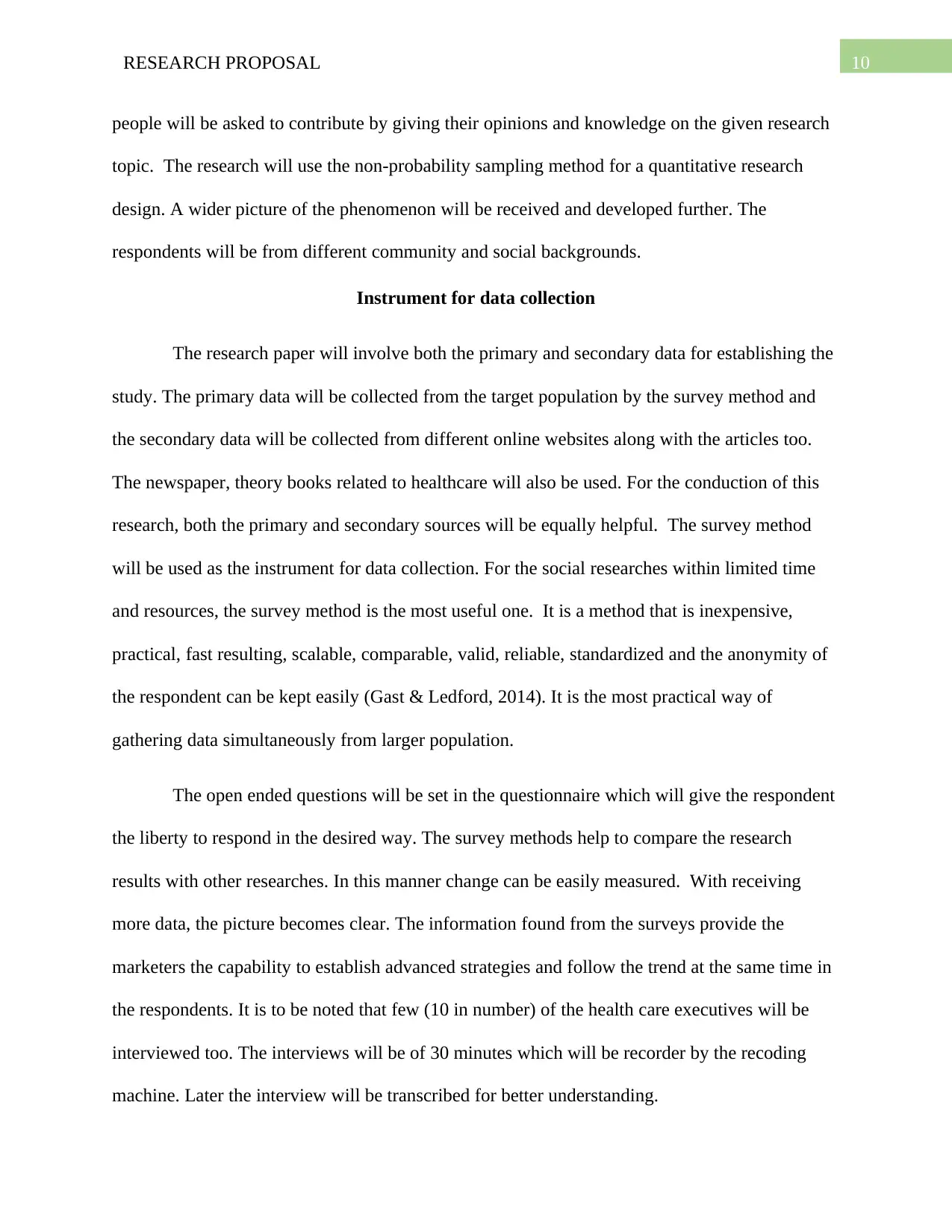
10RESEARCH PROPOSAL
people will be asked to contribute by giving their opinions and knowledge on the given research
topic. The research will use the non-probability sampling method for a quantitative research
design. A wider picture of the phenomenon will be received and developed further. The
respondents will be from different community and social backgrounds.
Instrument for data collection
The research paper will involve both the primary and secondary data for establishing the
study. The primary data will be collected from the target population by the survey method and
the secondary data will be collected from different online websites along with the articles too.
The newspaper, theory books related to healthcare will also be used. For the conduction of this
research, both the primary and secondary sources will be equally helpful. The survey method
will be used as the instrument for data collection. For the social researches within limited time
and resources, the survey method is the most useful one. It is a method that is inexpensive,
practical, fast resulting, scalable, comparable, valid, reliable, standardized and the anonymity of
the respondent can be kept easily (Gast & Ledford, 2014). It is the most practical way of
gathering data simultaneously from larger population.
The open ended questions will be set in the questionnaire which will give the respondent
the liberty to respond in the desired way. The survey methods help to compare the research
results with other researches. In this manner change can be easily measured. With receiving
more data, the picture becomes clear. The information found from the surveys provide the
marketers the capability to establish advanced strategies and follow the trend at the same time in
the respondents. It is to be noted that few (10 in number) of the health care executives will be
interviewed too. The interviews will be of 30 minutes which will be recorder by the recoding
machine. Later the interview will be transcribed for better understanding.
people will be asked to contribute by giving their opinions and knowledge on the given research
topic. The research will use the non-probability sampling method for a quantitative research
design. A wider picture of the phenomenon will be received and developed further. The
respondents will be from different community and social backgrounds.
Instrument for data collection
The research paper will involve both the primary and secondary data for establishing the
study. The primary data will be collected from the target population by the survey method and
the secondary data will be collected from different online websites along with the articles too.
The newspaper, theory books related to healthcare will also be used. For the conduction of this
research, both the primary and secondary sources will be equally helpful. The survey method
will be used as the instrument for data collection. For the social researches within limited time
and resources, the survey method is the most useful one. It is a method that is inexpensive,
practical, fast resulting, scalable, comparable, valid, reliable, standardized and the anonymity of
the respondent can be kept easily (Gast & Ledford, 2014). It is the most practical way of
gathering data simultaneously from larger population.
The open ended questions will be set in the questionnaire which will give the respondent
the liberty to respond in the desired way. The survey methods help to compare the research
results with other researches. In this manner change can be easily measured. With receiving
more data, the picture becomes clear. The information found from the surveys provide the
marketers the capability to establish advanced strategies and follow the trend at the same time in
the respondents. It is to be noted that few (10 in number) of the health care executives will be
interviewed too. The interviews will be of 30 minutes which will be recorder by the recoding
machine. Later the interview will be transcribed for better understanding.
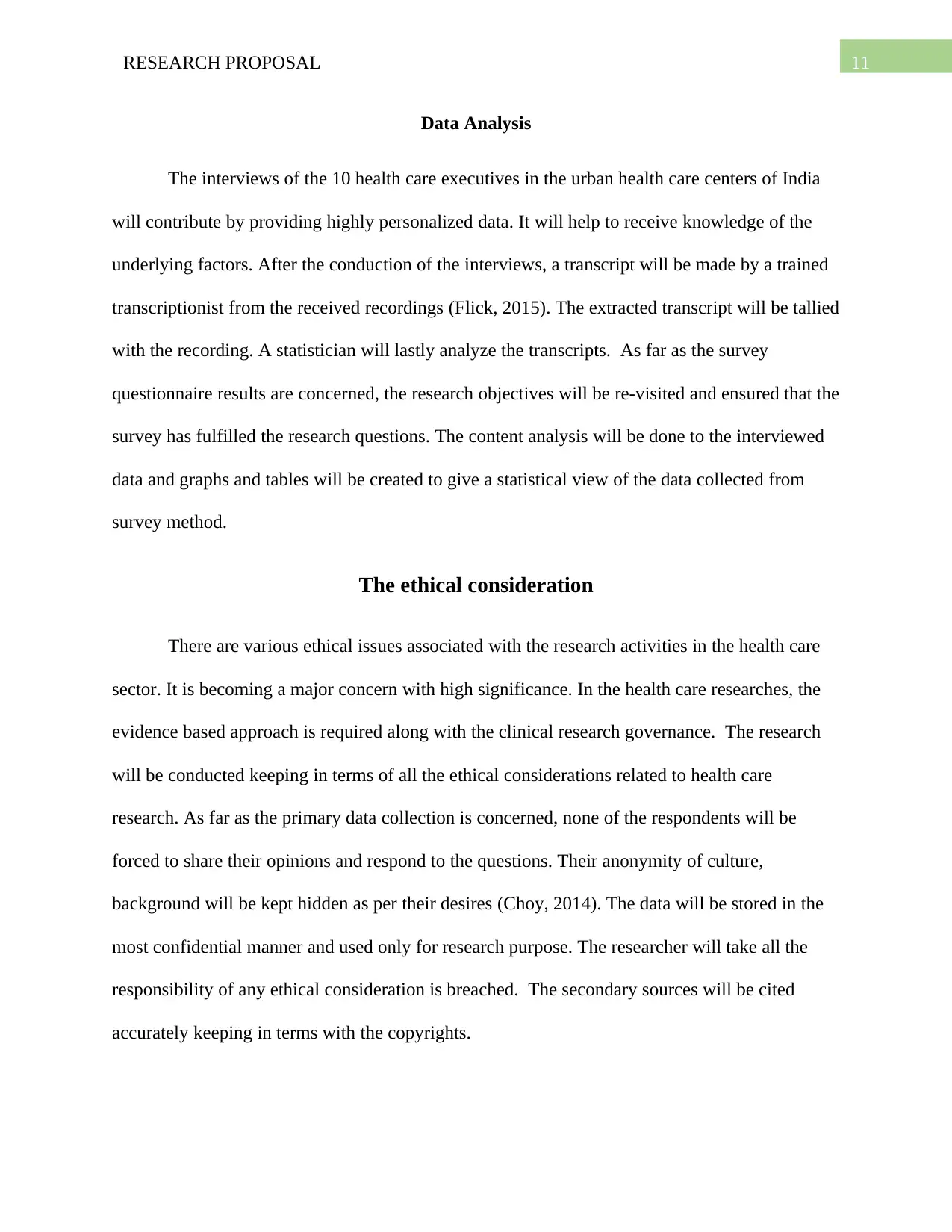
11RESEARCH PROPOSAL
Data Analysis
The interviews of the 10 health care executives in the urban health care centers of India
will contribute by providing highly personalized data. It will help to receive knowledge of the
underlying factors. After the conduction of the interviews, a transcript will be made by a trained
transcriptionist from the received recordings (Flick, 2015). The extracted transcript will be tallied
with the recording. A statistician will lastly analyze the transcripts. As far as the survey
questionnaire results are concerned, the research objectives will be re-visited and ensured that the
survey has fulfilled the research questions. The content analysis will be done to the interviewed
data and graphs and tables will be created to give a statistical view of the data collected from
survey method.
The ethical consideration
There are various ethical issues associated with the research activities in the health care
sector. It is becoming a major concern with high significance. In the health care researches, the
evidence based approach is required along with the clinical research governance. The research
will be conducted keeping in terms of all the ethical considerations related to health care
research. As far as the primary data collection is concerned, none of the respondents will be
forced to share their opinions and respond to the questions. Their anonymity of culture,
background will be kept hidden as per their desires (Choy, 2014). The data will be stored in the
most confidential manner and used only for research purpose. The researcher will take all the
responsibility of any ethical consideration is breached. The secondary sources will be cited
accurately keeping in terms with the copyrights.
Data Analysis
The interviews of the 10 health care executives in the urban health care centers of India
will contribute by providing highly personalized data. It will help to receive knowledge of the
underlying factors. After the conduction of the interviews, a transcript will be made by a trained
transcriptionist from the received recordings (Flick, 2015). The extracted transcript will be tallied
with the recording. A statistician will lastly analyze the transcripts. As far as the survey
questionnaire results are concerned, the research objectives will be re-visited and ensured that the
survey has fulfilled the research questions. The content analysis will be done to the interviewed
data and graphs and tables will be created to give a statistical view of the data collected from
survey method.
The ethical consideration
There are various ethical issues associated with the research activities in the health care
sector. It is becoming a major concern with high significance. In the health care researches, the
evidence based approach is required along with the clinical research governance. The research
will be conducted keeping in terms of all the ethical considerations related to health care
research. As far as the primary data collection is concerned, none of the respondents will be
forced to share their opinions and respond to the questions. Their anonymity of culture,
background will be kept hidden as per their desires (Choy, 2014). The data will be stored in the
most confidential manner and used only for research purpose. The researcher will take all the
responsibility of any ethical consideration is breached. The secondary sources will be cited
accurately keeping in terms with the copyrights.
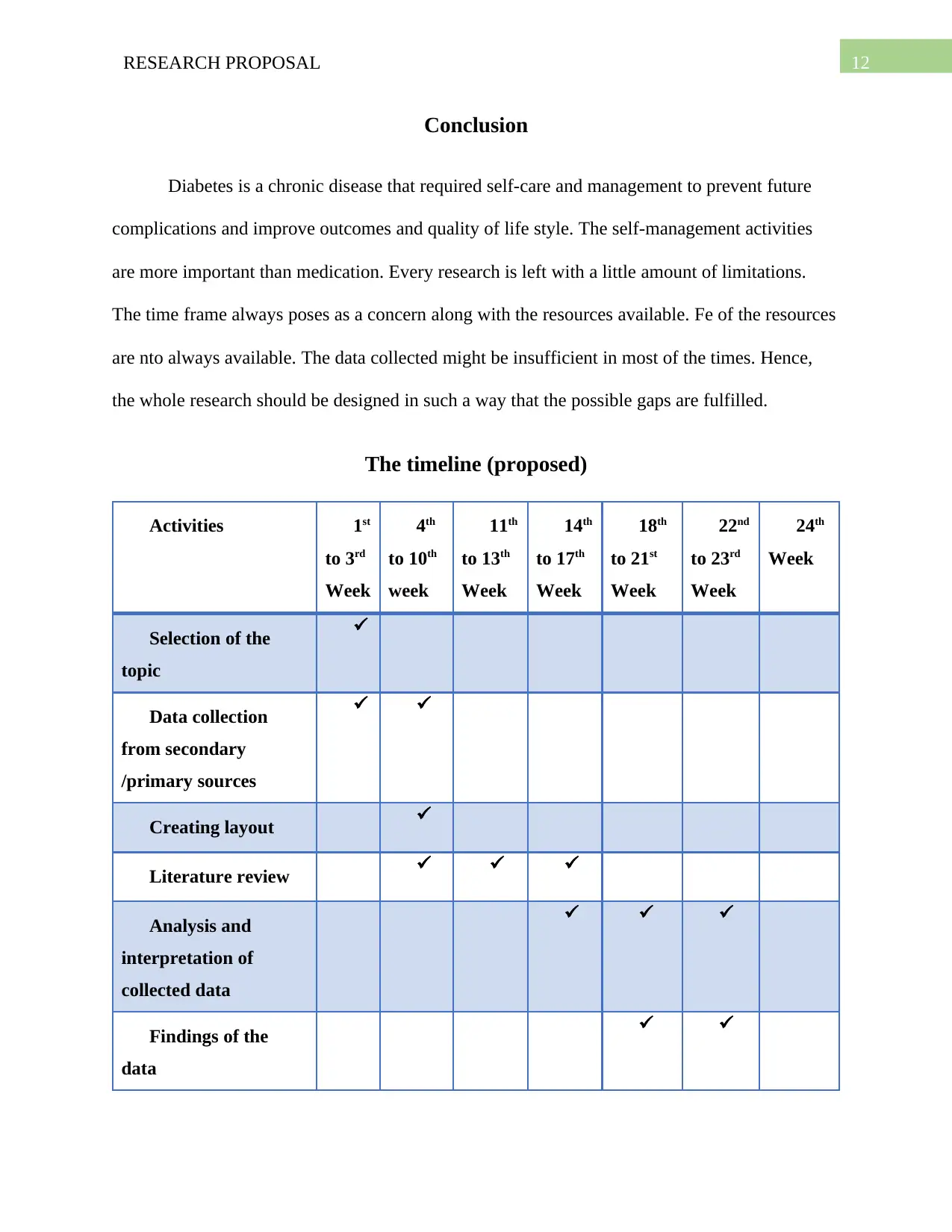
12RESEARCH PROPOSAL
Conclusion
Diabetes is a chronic disease that required self-care and management to prevent future
complications and improve outcomes and quality of life style. The self-management activities
are more important than medication. Every research is left with a little amount of limitations.
The time frame always poses as a concern along with the resources available. Fe of the resources
are nto always available. The data collected might be insufficient in most of the times. Hence,
the whole research should be designed in such a way that the possible gaps are fulfilled.
The timeline (proposed)
Activities 1st
to 3rd
Week
4th
to 10th
week
11th
to 13th
Week
14th
to 17th
Week
18th
to 21st
Week
22nd
to 23rd
Week
24th
Week
Selection of the
topic
Data collection
from secondary
/primary sources
Creating layout
Literature review
Analysis and
interpretation of
collected data
Findings of the
data
Conclusion
Diabetes is a chronic disease that required self-care and management to prevent future
complications and improve outcomes and quality of life style. The self-management activities
are more important than medication. Every research is left with a little amount of limitations.
The time frame always poses as a concern along with the resources available. Fe of the resources
are nto always available. The data collected might be insufficient in most of the times. Hence,
the whole research should be designed in such a way that the possible gaps are fulfilled.
The timeline (proposed)
Activities 1st
to 3rd
Week
4th
to 10th
week
11th
to 13th
Week
14th
to 17th
Week
18th
to 21st
Week
22nd
to 23rd
Week
24th
Week
Selection of the
topic
Data collection
from secondary
/primary sources
Creating layout
Literature review
Analysis and
interpretation of
collected data
Findings of the
data
Paraphrase This Document
Need a fresh take? Get an instant paraphrase of this document with our AI Paraphraser
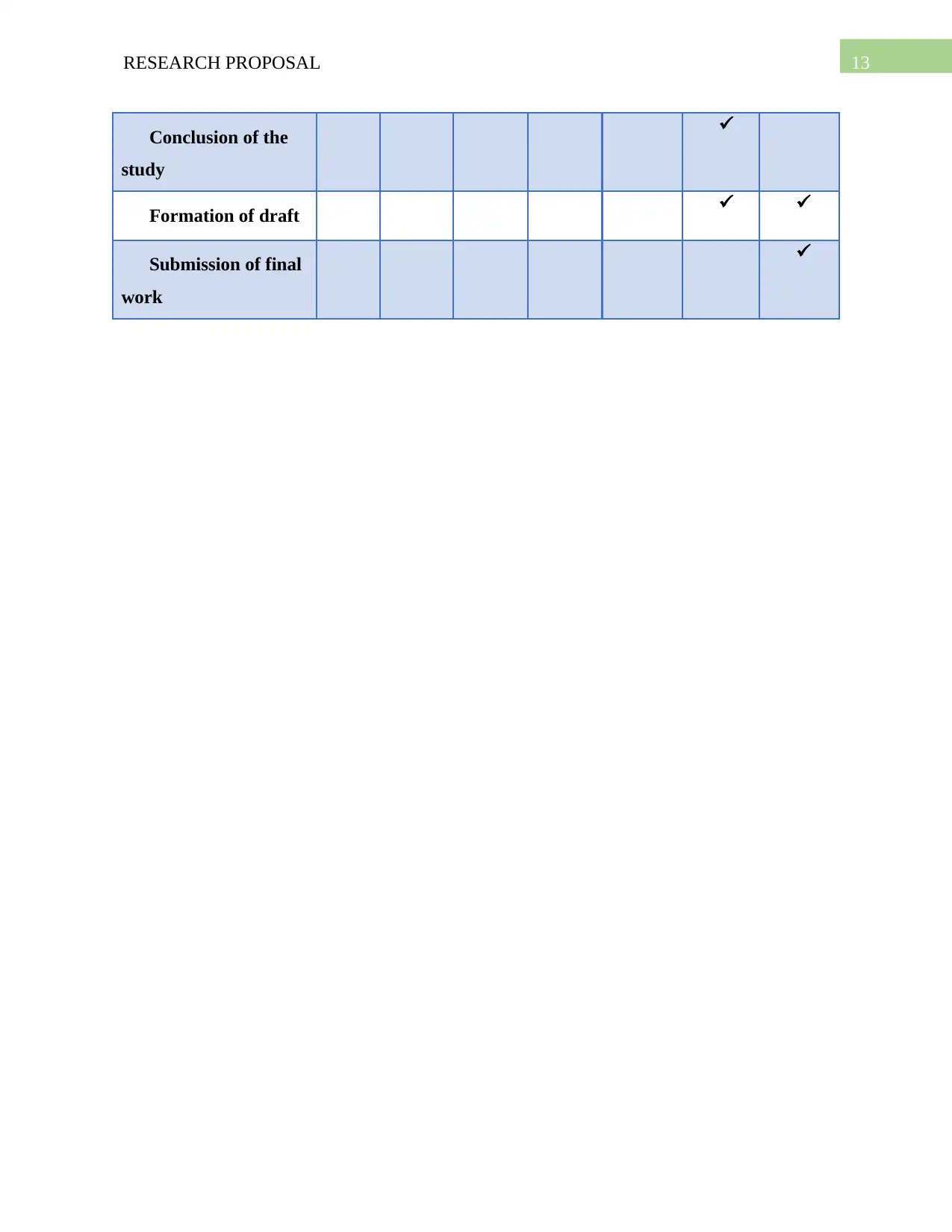
13RESEARCH PROPOSAL
Conclusion of the
study
Formation of draft
Submission of final
work
Conclusion of the
study
Formation of draft
Submission of final
work
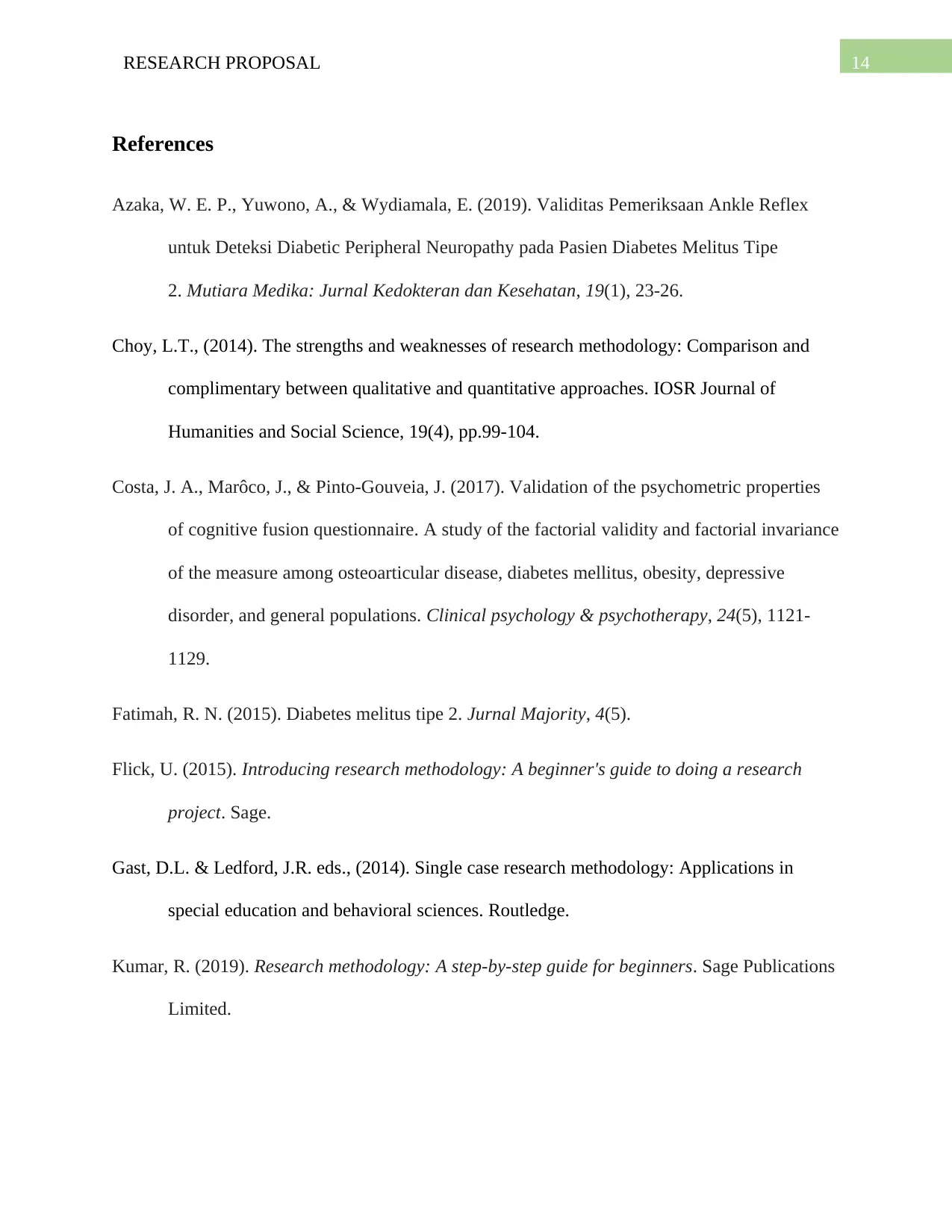
14RESEARCH PROPOSAL
References
Azaka, W. E. P., Yuwono, A., & Wydiamala, E. (2019). Validitas Pemeriksaan Ankle Reflex
untuk Deteksi Diabetic Peripheral Neuropathy pada Pasien Diabetes Melitus Tipe
2. Mutiara Medika: Jurnal Kedokteran dan Kesehatan, 19(1), 23-26.
Choy, L.T., (2014). The strengths and weaknesses of research methodology: Comparison and
complimentary between qualitative and quantitative approaches. IOSR Journal of
Humanities and Social Science, 19(4), pp.99-104.
Costa, J. A., Marôco, J., & Pinto‐Gouveia, J. (2017). Validation of the psychometric properties
of cognitive fusion questionnaire. A study of the factorial validity and factorial invariance
of the measure among osteoarticular disease, diabetes mellitus, obesity, depressive
disorder, and general populations. Clinical psychology & psychotherapy, 24(5), 1121-
1129.
Fatimah, R. N. (2015). Diabetes melitus tipe 2. Jurnal Majority, 4(5).
Flick, U. (2015). Introducing research methodology: A beginner's guide to doing a research
project. Sage.
Gast, D.L. & Ledford, J.R. eds., (2014). Single case research methodology: Applications in
special education and behavioral sciences. Routledge.
Kumar, R. (2019). Research methodology: A step-by-step guide for beginners. Sage Publications
Limited.
References
Azaka, W. E. P., Yuwono, A., & Wydiamala, E. (2019). Validitas Pemeriksaan Ankle Reflex
untuk Deteksi Diabetic Peripheral Neuropathy pada Pasien Diabetes Melitus Tipe
2. Mutiara Medika: Jurnal Kedokteran dan Kesehatan, 19(1), 23-26.
Choy, L.T., (2014). The strengths and weaknesses of research methodology: Comparison and
complimentary between qualitative and quantitative approaches. IOSR Journal of
Humanities and Social Science, 19(4), pp.99-104.
Costa, J. A., Marôco, J., & Pinto‐Gouveia, J. (2017). Validation of the psychometric properties
of cognitive fusion questionnaire. A study of the factorial validity and factorial invariance
of the measure among osteoarticular disease, diabetes mellitus, obesity, depressive
disorder, and general populations. Clinical psychology & psychotherapy, 24(5), 1121-
1129.
Fatimah, R. N. (2015). Diabetes melitus tipe 2. Jurnal Majority, 4(5).
Flick, U. (2015). Introducing research methodology: A beginner's guide to doing a research
project. Sage.
Gast, D.L. & Ledford, J.R. eds., (2014). Single case research methodology: Applications in
special education and behavioral sciences. Routledge.
Kumar, R. (2019). Research methodology: A step-by-step guide for beginners. Sage Publications
Limited.
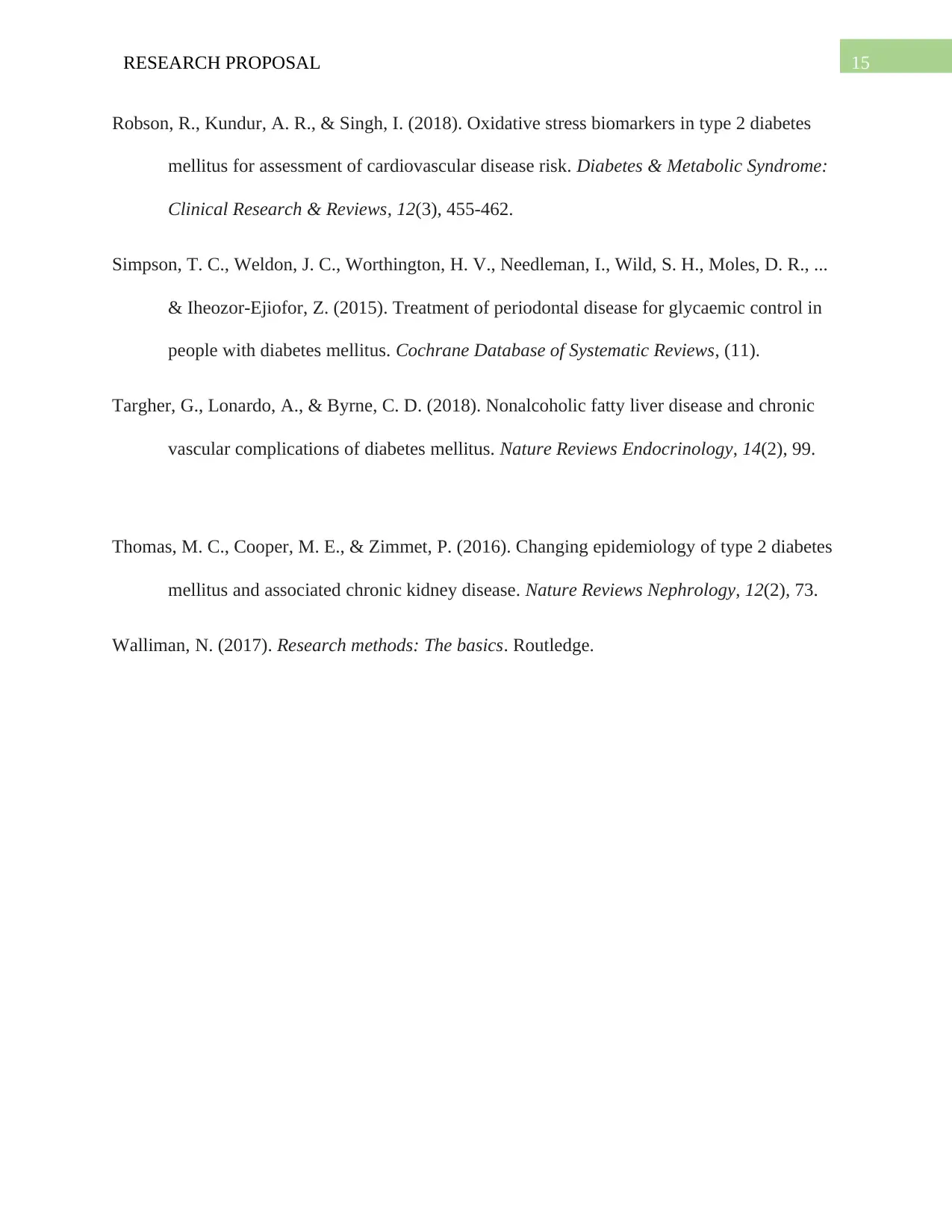
15RESEARCH PROPOSAL
Robson, R., Kundur, A. R., & Singh, I. (2018). Oxidative stress biomarkers in type 2 diabetes
mellitus for assessment of cardiovascular disease risk. Diabetes & Metabolic Syndrome:
Clinical Research & Reviews, 12(3), 455-462.
Simpson, T. C., Weldon, J. C., Worthington, H. V., Needleman, I., Wild, S. H., Moles, D. R., ...
& Iheozor‐Ejiofor, Z. (2015). Treatment of periodontal disease for glycaemic control in
people with diabetes mellitus. Cochrane Database of Systematic Reviews, (11).
Targher, G., Lonardo, A., & Byrne, C. D. (2018). Nonalcoholic fatty liver disease and chronic
vascular complications of diabetes mellitus. Nature Reviews Endocrinology, 14(2), 99.
Thomas, M. C., Cooper, M. E., & Zimmet, P. (2016). Changing epidemiology of type 2 diabetes
mellitus and associated chronic kidney disease. Nature Reviews Nephrology, 12(2), 73.
Walliman, N. (2017). Research methods: The basics. Routledge.
Robson, R., Kundur, A. R., & Singh, I. (2018). Oxidative stress biomarkers in type 2 diabetes
mellitus for assessment of cardiovascular disease risk. Diabetes & Metabolic Syndrome:
Clinical Research & Reviews, 12(3), 455-462.
Simpson, T. C., Weldon, J. C., Worthington, H. V., Needleman, I., Wild, S. H., Moles, D. R., ...
& Iheozor‐Ejiofor, Z. (2015). Treatment of periodontal disease for glycaemic control in
people with diabetes mellitus. Cochrane Database of Systematic Reviews, (11).
Targher, G., Lonardo, A., & Byrne, C. D. (2018). Nonalcoholic fatty liver disease and chronic
vascular complications of diabetes mellitus. Nature Reviews Endocrinology, 14(2), 99.
Thomas, M. C., Cooper, M. E., & Zimmet, P. (2016). Changing epidemiology of type 2 diabetes
mellitus and associated chronic kidney disease. Nature Reviews Nephrology, 12(2), 73.
Walliman, N. (2017). Research methods: The basics. Routledge.
1 out of 16
Related Documents
Your All-in-One AI-Powered Toolkit for Academic Success.
+13062052269
info@desklib.com
Available 24*7 on WhatsApp / Email
![[object Object]](/_next/static/media/star-bottom.7253800d.svg)
Unlock your academic potential
© 2024 | Zucol Services PVT LTD | All rights reserved.





